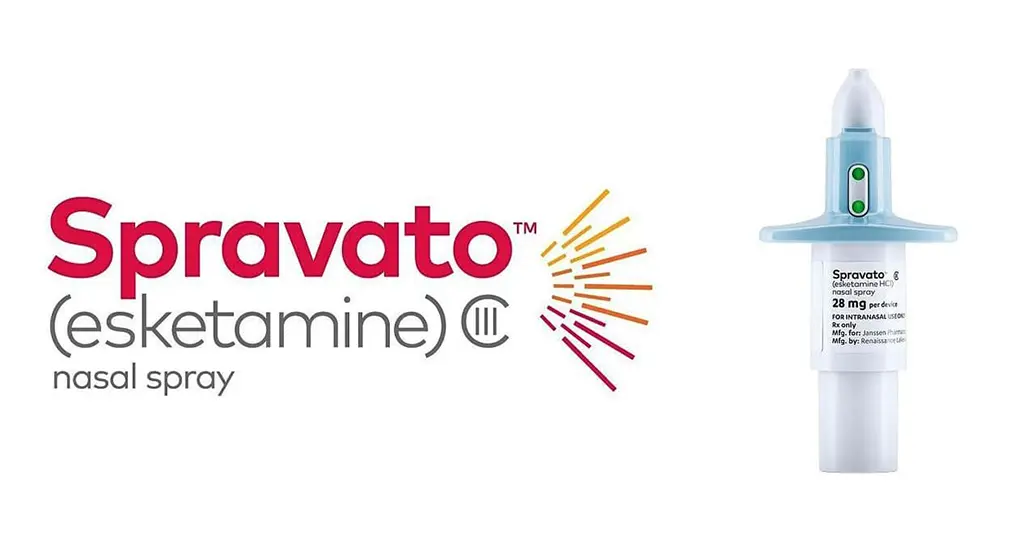For many people with depression, taking an antidepressant and seeing a therapist for psychological counseling helps to relieve depression symptoms and enable them to get back to enjoying life.
But standard therapies don’t do enough to alleviate depression in everyone. Those who have been treated for depression, but whose symptoms either don’t get better or keep coming back, may have Treatment-Resistant Depression (TRD). Treatment-resistant depression affects up to one-third of those who have a major depressive disorder.

Fortunately, there’s a promising treatment that’s providing relief for many people with difficult-to-treat depression. The medication, esketamine (brand name: Spravato®), is a nasal spray that starts working quickly, and has been shown in clinical trials to help many adults struggling with TRD feel better.
SunCloud Health is pleased to be one of a select number of providers in the Chicago area certified to offer Spravato to our patients experiencing treatment-resistant depression.
How Can Spravato Help Adults with TRD?
Having a mood disorder that isn’t responding to antidepressant medications can be very demoralizing for people who are already suffering from depressive symptoms such as a persistent down disposition, sadness, a loss of pleasure, and feelings of despair or worthlessness.
Spravato demonstrated in clinical trials that it can benefit many people whose depression has proven difficult to treat. In subsequent studies, many patients taking Spravato reported improvements in their emotional health and social functioning. The benefits included a better outlook, feeling less anxious, having more energy, greater life satisfaction, and an improved ability to cope with daily stress. And many of these benefits are seen soon after starting the medication.
- While traditional antidepressants may take a few weeks to take effect, Spravato may provide relief in as little as a few days, or even hours.
- Some of our patients report that esketamine therapy is helping them experience life without depression for the first time in years.
What Is Spravato?
Esketamine (Spravato) is derived from ketamine, an anesthetic that has been used for decades by physicians to relieve pain. Interest in ketamine therapy as a treatment for depression took off in 2000, when researchers at Yale School of Medicine published the first randomized controlled trial that showed a single dose of intravenous ketamine infusions improved symptoms of depression in many participants in as little as a few hours.
- Esketamine can be taken via nasal spray, whereas ketamine treatment is given via an IV infusion.
- Esketamine is approved by the U.S. Food and Drug Administration because it was proven to be safe and effective in clinical trials. Ketamine to treat depression is not yet FDA approved, although research continues.
- Esketamine therapy is covered by many major commercial insurance plans, and Medicare plans also now cover SPRAVATO® treatment for major depression. Ketamine isn’t FDA approved and therefore isn’t covered by insurance.
For more information on the difference between ketamine and esketamine, as well as comparisons to antidepressant medications, reach out to our intake team today.
Find your path to healing. Start today.
Find Compassionate, effective help now.
Who Can Take Spravato?
- Adults with Treatment-Resistant Depression (TRD)
- Adults with Major Depressive Disorder (MDD) who have suicidal thoughts or actions
Patients with treatment-resistant depression must have tried at least two other antidepressants, but haven’t experienced remission or at least a 50 percent improvement in their mood. Patients who are suicidal do not have to fail two antidepressants – they can proceed directly to Spravato.
People with major depressive disorder have other diagnoses, such as anxiety disorders, Post-Traumatic Stress Disorder (PTSD), Obsessive-Compulsive Disorder (OCD) or a history of drug or other substance abuse. Your physician will discuss this with you, but often patients with dual disorders can still take Spravato. Spravato isn’t recommended for women who are pregnant or breastfeeding. For more information on Spravato, please visit the Spravato website.
Your recovery journey starts here. Call now.
Find Compassionate, effective help now.
How Is Spravato Taken?
Spravato is a self-administered nasal spray that’s taken under the supervision of a healthcare provider at a certified Spravato treatment center, such as SunCloud Health. The dosing is typically:
Spravato is a self-administered nasal spray that’s taken under the supervision of a healthcare provider at a certified Spravato treatment center, such as SunCloud Health. The dosing is typically:
- Weeks 1 to 4: Two times weekly
- Weeks 5 to 8: Once a week
- Weeks 9 and beyond: Once a week or once every other week.
Spravato is used in combination with oral antidepressants, such as an SSRI (Selective Serotonin Reuptake Inhibitor) or SNRI (Serotonin and Norepinephrine Reuptake Inhibitor). The most common side effects include sedation, dissociation (feeling “out of body”), dizziness, nausea, and headache. For a full list of potential side effects, visit the Spravato website. (Between treatments, there are few if any side effects.)
On treatment days, patients are monitored for at least two hours. Patients may not drive until the next day, so you’ll need to make sure you have a ride to and from treatment. To make sure you are comfortable and relaxed during the monitoring period, SunCloud Health offers:
- A quiet, comfortable setting
- High-speed internet
- Snacks and refreshments
You and your doctor will decide together how long you should continue taking Spravato for MDD or treatment-resistant depression. But it’s recommended that you don’t stop taking medications abruptly or without consulting your physician.

We’re here for you today. Reach out now.
Find Compassionate, effective help now.
How Does Spravato Work?
One reason esketamine is so exciting is that it’s the first new nasal spray form of medication for depression to be introduced in many years that has a different mechanism of action than existing antidepressants.
Conventional antidepressants interact with receptors involved with naturally occurring chemicals such as serotonin, norepinephrine, and dopamine in the brain. These chemicals are messengers that relay communication between brain cells. It’s thought that boosting these neurotransmitters can have a positive effect on mood as the individual experiences relief from depression.
Esketamine works differently than conventional medications or ketamine treatment. It interacts with receptors that control the release of glutamate, a neurotransmitter found widely throughout the brain. Scientists aren’t entirely sure how this treatment response relieves depression or depression symptoms. But it’s thought that by activating the glutamatergic system, esketamine may both immediately improve depressive symptoms, and have a longer-term effect of altering glutamate signaling in the brain.
Research has suggested that together this may improve the neuroplasticity of the brain. Neuroplasticity enables the brain to create new, more positive thought processes and behaviors. This enables the brain to cope better with stress and, potentially, reverse depression-related brain changes.
How Can I Prepare for Spravato Therapy?
- Ask a friend or loved one for a ride to and from your appointment.
- Bring a book, headphones, or something for entertainment during the post-treatment monitoring phase.
Call Us to see if Spravato is the right treatment for you.
To see if SPRAVATO® or other treatments like ketamine therapy are right for you, or for more information on how esketamine or ketamine works for treatment-resistant depression, please contact us at and our intake psychiatry team will be happy to help. Many major commercial and Medicare plans are now approved to cover Spravato treatment cost(s) for depression. SunCloud Health accepts many major insurances for Spravato treatment, including Aetna, Blue Cross Blue Shield, Cigna, Humana, and others. As with other medical treatments, contact your insurance coverage provider to confirm whether SPRAVATO® is covered for you.
Having thoughts of suicide? Call 988.
If you’re thinking about suicide or having suicidal thoughts, please reach out for help now. The Suicide and Crisis Lifeline offers free, confidential support 24/7 from trained crisis counselors. Just dial 988.
Video: Depression: Not Allowed To Die Podcast
DR. ANANDAPPA ON TMS, ESKETAMINE, AND KETAMINE FOR TREATMENT-RESISTANT
Take the first step now. Contact us today.
We’re here to guide you through the depression treatment process.
Video: Explaining SunCloud’s Integrated Model Why is an integrated treatment model essential to successfully treating patients?
Dr. Kim Dennis, Co-Founder and Medical Director at SunCloud Health, discusses the vital role the integrated model (that she is pioneering at SunCloud Health) plays in the success of treating patients with co-occurring disorders and underlying trauma. How does SunCloud create an authentic culture of patient support?
